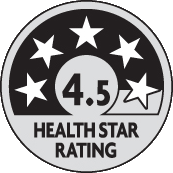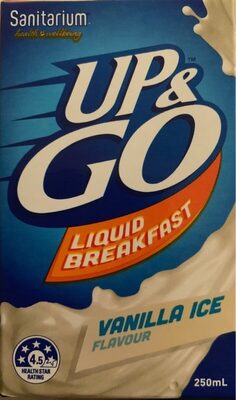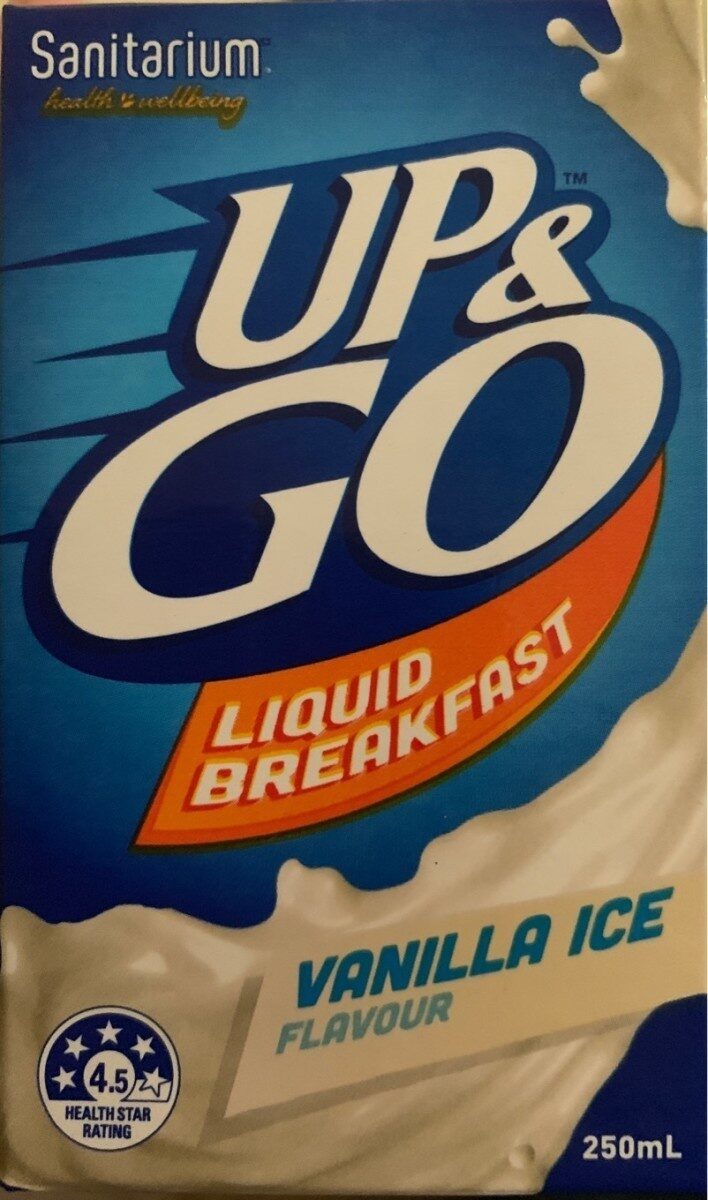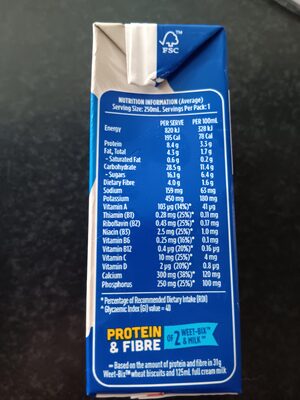Help us make food transparency the norm!
As a non-profit organization, we depend on your donations to continue informing consumers around the world about what they eat.
The food revolution starts with you!
Up & Go Vanilla Ice - Sanitarium - 250ml
Up & Go Vanilla Ice - Sanitarium - 250ml
This product page is not complete. You can help to complete it by editing it and adding more data from the photos we have, or by taking more photos using the app for Android or iPhone/iPad. Thank you!
×
Barcode: 9300652010589 (EAN / EAN-13)
Quantity: 250ml
Brands: Sanitarium
Categories: Beverages and beverages preparations, Beverages, Dairies, Dairy drinks, Flavoured milks
Labels, certifications, awards:
Australian made, Health Star Rating, Health Star Rating 4.5
Origin of the product and/or its ingredients: Made in Australia with at least 83% Australian ingredients
Origin of ingredients: Australia
Manufacturing or processing places: Australia
Countries where sold: Australia, New Zealand
Matching with your preferences
Health
Ingredients
-
34 ingredients
Water, skim milk powder, maltodextrin (wheat, corn), cane sugar, plant fibre, soy protein, vegetable oils (sunflower, canola), fructose, oat flour, acidity regulator (potassium citrate), flavours, mineral (calcium), vegetable gums (460, 466, 407), stabiliser (452), vitamins (C, B3, A, D2, B2, B1, B12, B6), salt.Allergens: Gluten, Milk, Soybeans
Food processing
-
Ultra processed foods
Elements that indicate the product is in the 4 - Ultra processed food and drink products group:
- Additive: E407 - Carrageenan
- Additive: E452 - Polyphosphates
- Additive: E460 - Cellulose
- Additive: E466 - Sodium carboxy methyl cellulose
- Ingredient: Flavouring
- Ingredient: Maltodextrin
Food products are classified into 4 groups according to their degree of processing:
- Unprocessed or minimally processed foods
- Processed culinary ingredients
- Processed foods
- Ultra processed foods
The determination of the group is based on the category of the product and on the ingredients it contains.
Additives
-
E332 - Potassium citrates
Potassium citrate: Potassium citrate -also known as tripotassium citrate- is a potassium salt of citric acid with the molecular formula K3C6H5O7. It is a white, hygroscopic crystalline powder. It is odorless with a saline taste. It contains 38.28% potassium by mass. In the monohydrate form it is highly hygroscopic and deliquescent. As a food additive, potassium citrate is used to regulate acidity and is known as E number E332. Medicinally, it may be used to control kidney stones derived from either uric acid or cystine.Source: Wikipedia
-
E332ii - Tripotassium citrate
Potassium citrate: Potassium citrate -also known as tripotassium citrate- is a potassium salt of citric acid with the molecular formula K3C6H5O7. It is a white, hygroscopic crystalline powder. It is odorless with a saline taste. It contains 38.28% potassium by mass. In the monohydrate form it is highly hygroscopic and deliquescent. As a food additive, potassium citrate is used to regulate acidity and is known as E number E332. Medicinally, it may be used to control kidney stones derived from either uric acid or cystine.Source: Wikipedia
-
E407 - Carrageenan
Carrageenan (E407), derived from red seaweed, is widely employed in the food industry as a gelling, thickening, and stabilizing agent, notably in dairy and meat products.
It can exist in various forms, each imparting distinct textural properties to food.
However, its degraded form, often referred to as poligeenan, has raised health concerns due to its potential inflammatory effects and its classification as a possible human carcinogen (Group 2B) by the International Agency for Research on Cancer (IARC).
Nevertheless, food-grade carrageenan has been deemed safe by various regulatory bodies when consumed in amounts typically found in food.
-
E460 - Cellulose
Cellulose: Cellulose is an organic compound with the formula -C6H10O5-n, a polysaccharide consisting of a linear chain of several hundred to many thousands of β-1→4- linked D-glucose units. Cellulose is an important structural component of the primary cell wall of green plants, many forms of algae and the oomycetes. Some species of bacteria secrete it to form biofilms. Cellulose is the most abundant organic polymer on Earth. The cellulose content of cotton fiber is 90%, that of wood is 40–50%, and that of dried hemp is approximately 57%.Cellulose is mainly used to produce paperboard and paper. Smaller quantities are converted into a wide variety of derivative products such as cellophane and rayon. Conversion of cellulose from energy crops into biofuels such as cellulosic ethanol is under development as a renewable fuel source. Cellulose for industrial use is mainly obtained from wood pulp and cotton.Some animals, particularly ruminants and termites, can digest cellulose with the help of symbiotic micro-organisms that live in their guts, such as Trichonympha. In human nutrition, cellulose is a non-digestible constituent of insoluble dietary fiber, acting as a hydrophilic bulking agent for feces and potentially aiding in defecation.Source: Wikipedia
-
E466 - Sodium carboxy methyl cellulose
Carboxymethyl cellulose: Carboxymethyl cellulose -CMC- or cellulose gum or tylose powder is a cellulose derivative with carboxymethyl groups --CH2-COOH- bound to some of the hydroxyl groups of the glucopyranose monomers that make up the cellulose backbone. It is often used as its sodium salt, sodium carboxymethyl cellulose.Source: Wikipedia
Ingredients analysis
-
Palm oil free
No ingredients containing palm oil detected
Unrecognized ingredients: Vegetable-gums, 460, 466, 407, 452Some ingredients could not be recognized.
We need your help!
You can help us recognize more ingredients and better analyze the list of ingredients for this product and others:
- Edit this product page to correct spelling mistakes in the ingredients list, and/or to remove ingredients in other languages and sentences that are not related to the ingredients.
- Add new entries, synonyms or translations to our multilingual lists of ingredients, ingredient processing methods, and labels.
If you would like to help, join the #ingredients channel on our Slack discussion space and/or learn about ingredients analysis on our wiki. Thank you!
-
Non-vegan
Non-vegan ingredients: Skimmed milk powderSome ingredients could not be recognized.
We need your help!
You can help us recognize more ingredients and better analyze the list of ingredients for this product and others:
- Edit this product page to correct spelling mistakes in the ingredients list, and/or to remove ingredients in other languages and sentences that are not related to the ingredients.
- Add new entries, synonyms or translations to our multilingual lists of ingredients, ingredient processing methods, and labels.
If you would like to help, join the #ingredients channel on our Slack discussion space and/or learn about ingredients analysis on our wiki. Thank you!
-
Vegetarian status unknown
Unrecognized ingredients: Calcium, Vegetable-gums, 460, 466, 407, 452, Vitamin C, Thiamin, Vitamin b12Some ingredients could not be recognized.
We need your help!
You can help us recognize more ingredients and better analyze the list of ingredients for this product and others:
- Edit this product page to correct spelling mistakes in the ingredients list, and/or to remove ingredients in other languages and sentences that are not related to the ingredients.
- Add new entries, synonyms or translations to our multilingual lists of ingredients, ingredient processing methods, and labels.
If you would like to help, join the #ingredients channel on our Slack discussion space and/or learn about ingredients analysis on our wiki. Thank you!
-
Details of the analysis of the ingredients
We need your help!
Some ingredients could not be recognized.
We need your help!
You can help us recognize more ingredients and better analyze the list of ingredients for this product and others:
- Edit this product page to correct spelling mistakes in the ingredients list, and/or to remove ingredients in other languages and sentences that are not related to the ingredients.
- Add new entries, synonyms or translations to our multilingual lists of ingredients, ingredient processing methods, and labels.
If you would like to help, join the #ingredients channel on our Slack discussion space and/or learn about ingredients analysis on our wiki. Thank you!
en: Water, skim _milk_ powder, maltodextrin (_wheat_, corn), cane sugar, plant fibre, _soy_ protein, vegetable oils (sunflower, canola), fructose, _oat_ flour, acidity regulator (potassium citrate), flavours, mineral (calcium), vegetable gums (460, 466, 407), stabiliser (452), vitamins, vitamin C, vitamin B3, vitamin A, vitamin D2, vitamin B2, vitamin B1, vitamin B12, vitamin B6, salt- Water -> en:water - vegan: yes - vegetarian: yes - ciqual_food_code: 18066 - percent_min: 4.16666666666667 - percent_max: 100
- skim _milk_ powder -> en:skimmed-milk-powder - vegan: no - vegetarian: yes - ciqual_food_code: 19054 - percent_min: 0 - percent_max: 50
- maltodextrin -> en:maltodextrin - vegan: yes - vegetarian: yes - percent_min: 0 - percent_max: 33.3333333333333
- _wheat_ -> en:wheat - vegan: yes - vegetarian: yes - ciqual_proxy_food_code: 9410 - percent_min: 0 - percent_max: 33.3333333333333
- corn -> en:corn - vegan: yes - vegetarian: yes - ciqual_food_code: 9200 - percent_min: 0 - percent_max: 16.6666666666667
- cane sugar -> en:cane-sugar - vegan: yes - vegetarian: yes - ciqual_proxy_food_code: 31016 - percent_min: 0 - percent_max: 6.44
- plant fibre -> en:vegetable-fiber - vegan: yes - vegetarian: yes - percent_min: 0 - percent_max: 6.44
- _soy_ protein -> en:soy-protein - vegan: yes - vegetarian: yes - ciqual_food_code: 20591 - percent_min: 0 - percent_max: 6.44
- vegetable oils -> en:vegetable-oil - vegan: yes - vegetarian: yes - from_palm_oil: maybe - percent_min: 0 - percent_max: 6.44
- sunflower -> en:sunflower - vegan: yes - vegetarian: yes - percent_min: 0 - percent_max: 6.44
- canola -> en:canola - vegan: yes - vegetarian: yes - percent_min: 0 - percent_max: 3.22
- fructose -> en:fructose - vegan: yes - vegetarian: yes - ciqual_food_code: 31077 - percent_min: 0 - percent_max: 6.44
- _oat_ flour -> en:oat-flour - vegan: yes - vegetarian: yes - ciqual_food_code: 9310 - percent_min: 0 - percent_max: 6.44
- acidity regulator -> en:acidity-regulator - percent_min: 0 - percent_max: 6.44
- potassium citrate -> en:e332ii - vegan: yes - vegetarian: yes - percent_min: 0 - percent_max: 6.44
- flavours -> en:flavouring - vegan: maybe - vegetarian: maybe - percent_min: 0 - percent_max: 5
- mineral -> en:minerals - percent_min: 0 - percent_max: 5
- calcium -> en:calcium - percent_min: 0 - percent_max: 5
- vegetable gums -> en:vegetable-gums - percent_min: 0 - percent_max: 5
- 460 -> en:460 - percent_min: 0 - percent_max: 5
- 466 -> en:466 - percent_min: 0 - percent_max: 2.5
- 407 -> en:407 - percent_min: 0 - percent_max: 1.66666666666667
- stabiliser -> en:stabiliser - percent_min: 0 - percent_max: 5
- 452 -> en:452 - percent_min: 0 - percent_max: 5
- vitamins -> en:vitamins - vegan: yes - vegetarian: yes - percent_min: 0 - percent_max: 5
- vitamin C -> en:vitamin-c - percent_min: 0 - percent_max: 5
- vitamin B3 -> en:e375 - vegan: maybe - vegetarian: maybe - percent_min: 0 - percent_max: 5
- vitamin A -> en:vitamin-a - vegan: yes - vegetarian: yes - percent_min: 0 - percent_max: 5
- vitamin D2 -> en:ergocalciferol - vegan: yes - vegetarian: yes - percent_min: 0 - percent_max: 5
- vitamin B2 -> en:e101 - vegan: maybe - vegetarian: yes - percent_min: 0 - percent_max: 5
- vitamin B1 -> en:thiamin - percent_min: 0 - percent_max: 4.76190476190476
- vitamin B12 -> en:vitamin-b12 - percent_min: 0 - percent_max: 4.54545454545455
- vitamin B6 -> en:vitamin-b6 - vegan: yes - vegetarian: yes - percent_min: 0 - percent_max: 4.34782608695652
- salt -> en:salt - vegan: yes - vegetarian: yes - ciqual_food_code: 11058 - percent_min: 0 - percent_max: 0.159
Nutrition
-
Bad nutritional quality
⚠ ️Warning: the amount of fruits, vegetables and nuts is not specified on the label, it was estimated from the list of ingredients: 0This product is considered a beverage for the calculation of the Nutri-Score.
Positive points: 1
- Proteins: 2 / 5 (value: 3.36, rounded value: 3.36)
- Fiber: 1 / 5 (value: 1.6, rounded value: 1.6)
- Fruits, vegetables, nuts, and colza/walnut/olive oils: 0 / 10 (value: 0.692395833333332, rounded value: 0.7)
Negative points: 15
- Energy: 10 / 10 (value: 328, rounded value: 328)
- Sugars: 5 / 10 (value: 6.44, rounded value: 6.44)
- Saturated fat: 0 / 10 (value: 0.24, rounded value: 0.2)
- Sodium: 0 / 10 (value: 63.6, rounded value: 63.6)
The points for proteins are not counted because the negative points are greater or equal to 11.
Nutritional score: (15 - 1)
Nutri-Score:
-
Nutrient levels
-
Fat in moderate quantity (1.72%)
What you need to know- A high consumption of fat, especially saturated fats, can raise cholesterol, which increases the risk of heart diseases.
Recommendation: Limit the consumption of fat and saturated fat- Choose products with lower fat and saturated fat content.
-
Saturated fat in low quantity (0.24%)
What you need to know- A high consumption of fat, especially saturated fats, can raise cholesterol, which increases the risk of heart diseases.
Recommendation: Limit the consumption of fat and saturated fat- Choose products with lower fat and saturated fat content.
-
Sugars in high quantity (6.44%)
What you need to know- A high consumption of sugar can cause weight gain and tooth decay. It also augments the risk of type 2 diabetes and cardio-vascular diseases.
Recommendation: Limit the consumption of sugar and sugary drinks- Sugary drinks (such as sodas, fruit beverages, and fruit juices and nectars) should be limited as much as possible (no more than 1 glass a day).
- Choose products with lower sugar content and reduce the consumption of products with added sugars.
-
Salt in moderate quantity (0.159%)
What you need to know- A high consumption of salt (or sodium) can cause raised blood pressure, which can increase the risk of heart disease and stroke.
- Many people who have high blood pressure do not know it, as there are often no symptoms.
- Most people consume too much salt (on average 9 to 12 grams per day), around twice the recommended maximum level of intake.
Recommendation: Limit the consumption of salt and salted food- Reduce the quantity of salt used when cooking, and don't salt again at the table.
- Limit the consumption of salty snacks and choose products with lower salt content.
-
-
Nutrition facts
Nutrition facts As sold
for 100 g / 100 mlAs sold
per serving (250ml)Compared to: Flavoured milks Energy 328 kj
(78 kcal)820 kj
(195 kcal)-31% Fat 1.72 g 4.3 g -36% Saturated fat 0.24 g 0.6 g -85% Carbohydrates 11.4 g 28.5 g -30% Sugars 6.44 g 16.1 g -45% Fiber 1.6 g 4 g +16% Proteins 3.36 g 8.4 g -17% Salt 0.159 g 0.398 g -15% Vitamin A 41.2 µg 103 µg Vitamin D 0.8 µg 2 µg Vitamin C (ascorbic acid) 4 mg 10 mg Vitamin B1 (Thiamin) 0.112 mg 0.28 mg Vitamin B2 (Riboflavin) 0.172 mg 0.43 mg Vitamin B3/PP (Niacin) 1 mg 2.5 mg Vitamin B6 (Pyridoxin) 0.1 mg 0.25 mg Vitamin B12 (cobalamin) 0.16 µg 0.4 µg Potassium 180 mg 450 mg Calcium 120 mg 300 mg -3% Phosphorus 100 mg 250 mg Fruits‚ vegetables‚ nuts and rapeseed‚ walnut and olive oils (estimate from ingredients list analysis) 0.692 % 0.692 %
Environment
-
Eco-Score not computed - Unknown environmental impact
We could not compute the Eco-Score of this product as it is missing some data, could you help complete it?Could you add a precise product category so that we can compute the Eco-Score? Add a category
Packaging
-
Packaging with a low impact
-
Packaging parts
Brick (Tetra Pak)
-
Packaging materials
Material % Packaging weight Packaging weight per 100 g of product
-
Transportation
-
Origins of ingredients
Origins of ingredients with a high impact
Origin of the product and/or its ingredients % of ingredients Impact Australia 100 %Medium
Report a problem
-
Incomplete or incorrect information?
Category, labels, ingredients, allergens, nutritional information, photos etc.
If the information does not match the information on the packaging, please complete or correct it. Open Food Facts is a collaborative database, and every contribution is useful for all.
Data sources
Product added on by kiliweb
Last edit of product page on by lcmortensen.
Product page also edited by charlesnepote, clockwerx, halal-app-chakib, openfoodfacts-contributors, roboto-app, yuka.VzY0eFBZSWJwc0ZXaWMwZDhCVDAxYzVZK2JHSFdHNm9LdTROSWc9PQ, yuka.sY2b0xO6T85zoF3NwEKvllVCX_-G-DnHOA3RoWSi7Nu-ErzMR88v_YH8H6o.











